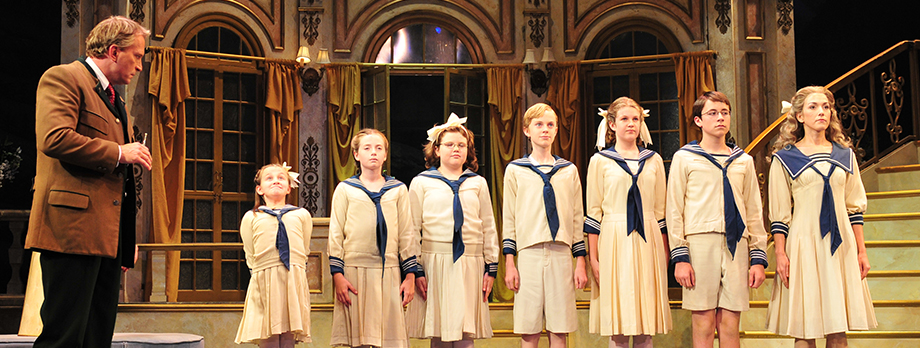ABOUT
The von Trapp Family Singers… “be not terrified by adversity”
Hitler's "quietinvasion" of Austriain 1938 inspired a musical tour de force, beginning with an opening night performance in 1959 and soaring into cinematic history six years later with Julie Andrews' memorable representation of Maria, the postulant who finds solace in the gorgeous but politically volatile Austrian alps. The timeless classic is of course The Sound of Music and its source is a story of love, war, courage and family – the story of the von Trapp Family Singers whose motto became, “be not terrified by adversity.”
In the summer of 1914 Archduke Franz Ferdinand, heir to the Austro-Hungarian throne, was assassinated in Sarajevo, starting a domino effect of volatile reactions throughout Europe culminating in World War I. Young Naval officer Georg von Trapp was summoned to serve as submarine commander for Austria-Hungary for the duration of the war, leaving behind his wife and two young children. In 1918, after Austria-Hungary’s and Germany’s devastating defeat, the German empire was broken up into separate countries and Austria became an independent republic with no political ties to Germany, no access to a seaport and no need for a Navy, forcing Captain von Trapp into retirement. He went into private business and he and his wife had five more children before she died of scarlet fever in 1922. The grieving family left their home in Pola and moved to an estate in Salzburg.
Maria Kutschera was born in 1905 on a train heading for a hospital in Vienna, Austria. She was orphaned by the age of seven and raised mostly by cousins until 1923 when she entered the Nonnberg Abbey in Salzburg at the age of 18. The Benedictine nuns sent her to the von Trapp home to tutor one of the seven children who had become ill and unable to attend school. Needless to say, Maria never returned to the Abbey! She married Capt. von Trapp in 1927.
By 1928 war was again on the horizon for Europe. Ramifications from the treaties put in place after the First World War, in essence to punish Germany, had unforeseen consequences as a young Adolf Hitler captured the imagination and preyed upon the desperation of the German people. His rise to power and the formation of the Third Reich brought to the world some of the most ghastly and horrifying events the human race had ever witnessed. Adding further devastation to Austria its most important bank failed, causing many people, including the von Trapp family to suffer financial losses. As a result the family turned their love of music and country and began touring as the von Trapp Family Singers. As the Nazi threat grew stronger and the Austrian nation more and more divided in its alliances, the von Trapp family, strongly aligned with Austria, found themselves in increasing danger. In 1938, like so many Europeans, they made the difficult decision to uproot and leave their beloved home. They made their way first to Italy and then on to America under the ruse of a holiday and music tour. In 1938 Hitler invaded Austria.
The Sound of Music is based on Maria von Trapp's autobiography The Story of the Trapp Family Singers. It was adapted for the stage by the venerable playwriting team, Howard Lindsay and Russel Crouse, with lyrics and music by Richard Rodgers and Oscar Hammerstein II. This highly regarded musical tells their real-life love story set against the backdrop of Nazi oppression and although it is delightfully entertaining, it is also a devastating condemnation of those who empower evil by refusing to oppose it. The story depicts many layers of human drama and each one speaks to the soul.
The songs in a Rogers and Hammerstein musical, are written and positioned to drive the story forward. The song “Edelweiss” exemplifies Rodgers and Hammerstein's use of musical drama at its best. It first appears as a simple folk song when Captain von Trapp sings it to his children in a light hearted moment early in the show. Later it is reprised in more dramatic context, during the Nazis' invasion, to evoke a strong sense of national pride and emotion.
"Edelweiss" is transformed into a political message, emblematic of the entire show's aspirant hope against tyranny. Rodgers and Hammerstein’s ability to explore serious topics through musical theatre was revolutionary in its time and is the trademark of their success. The Sound of Music was socially relevant when it was new, but is so timelessly written that it still touches audiences today.

